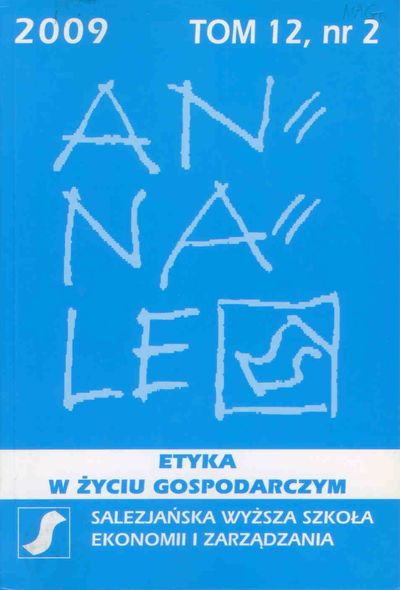Religions of the World and their Positions on Euthanasia
DOI:
https://doi.org/10.18778/1899-2226.12.2.02Keywords:
death, euthanasia, religions of the world, Christian ethicsAbstract
The attitude towards death and dying reflects the society’s view on a human being as a subject. Due to the progress in medical science a growing interest has been observed in the problem of death, including the right to dignified dying. One of the issues connected with the phenomenon of dying is the problem of euthanasia seen as one’s right to decide on one’s own death in extreme cases. The question of the legality of euthanasia is becoming a subject of consideration more and more often, which is a result of a celebratory culture of death and the obsolescence of faith and religious practice. The aim of the following report is to show the attitude of major religions of the world towards euthanasia. What arguments of religious nature are against the legality of mercy killing? Both Christian and non-Christian religions rise to speak on the matter. All religions stress their veto over mercy killing, justifying their view in various ways. Christians claim that God is the donor and lord of life; a man cannot decide on ending human life as he or she is only the user, not the owner of it. Judaism assumes that human life has an absolute value, is sacred, untouchable, as God’s gift. Islam, quoting Koran, also preserves life as God’s gift. According to Buddhist ethics, the annihilation of both one’s own and someone else’s life is the worst of evil deeds. Will the arguments of religious nature mean enough to stop the legality of euthanasia?
References
Aries P., Człowiek i śmierć, Państwowy Instytut Wydawniczy, Warszawa 1989.
Google Scholar
Benzenhöfer U., Der gute Tod? Euthanasie und Sterbehilfe in Geschichte und Gegenwart, Verlag, C.H. Beck, München 1999.
Google Scholar
Bołoz W., Czy życie może być życia warte. Eutanazja dobrowolna, „Rzeczpospolita” 2001, nr 3, luty.
Google Scholar
Bowker J., Sens śmierci, Polskie Wydawnictwo Naukowe, Warszawa 1996.
Google Scholar
Chyrowicz B., Eutanazja i spór o argumenty, [w:] Eutanazja: prawo do życia – prawo do wolności, red. B. Chyrowicz, Lublin: TN KUL 2005.
Google Scholar
Cordé de K., Opieka hospicyjna w terminalnej fazie choroby nowotworowej [w:] Żyć godnie do końca. Materiały z Polsko-Niemieckiego Sympozjum Poświęconego Opiece Paliatywnej, red. S. Skobel, Łódź 2000.
Google Scholar
Dyk W., Etyczny wymiar człowieka, Wydawnictwo Naukowe US, Szczecin 2002.
Google Scholar
Galarowicz J., Być ziarnem pszenicznym. Nowa książeczka o człowieku, Wydawnictwo MAREK DEREWIECKI, Kęty 2006.
Google Scholar
Golser K., Stanowisko Nauczycielskiego Kościoła na temat pomocy w umieraniu i eutanazji [w:] Eutanazja w dyskusji, red. P. Morciniec, Redakcja wydawnictw WT UO, Opole 2001.
Google Scholar
Griffin R., An Uninvited offer of Euthanasia [w:] A Good Ending, Good For All? Care for Carers Working in Paliative Care, red. H. Van der Ploeg, F. Baar, A. Stoppelenburg, TRED publisher, Tilburg 2003.
Google Scholar
Guzik A., Prawo do dobrej śmierci, „Prawo i życie” 1999, nr 14.
Google Scholar
Jakobovits I., Jawish Medical Ethics, Bloch Publishing, New York 1975.
Google Scholar
Jan Paweł II, Encyklika Veritatis splendor, Pallotinum, Poznań 1993.
Google Scholar
Jankélévitch V., To, co nieuchronne, Państwowy Instytut Wydawniczy, Warszawa 2005.
Google Scholar
Koran, PWN, Warszawa 1986.
Google Scholar
Księga Ezechiela 18, 4 [w:] Biblia to jest Pismo Święte Starego i Nowego Testamentu, Brytyjskie i Zagraniczne Towarzystwo Biblijne, Warszawa 1990.
Google Scholar
Machinek M., Śmierć w dyspozycji człowieka. Teologia moralna wobec problemów etycznych u kresu życia ludzkiego, Wydawnictwo Hosianum, Olsztyn 2001.
Google Scholar
Mądrość Syracha 25, 4, 6 [w:] Biblia to jest Pismo Święte Starego i Nowego Testamentu, Brytyjskie i Zagra-niczne Towarzystwo Biblijne, Warszawa 1990.
Google Scholar
Müller A., Prawo do eutanazji, Homo Dei 2, 2001.
Google Scholar
Ogryzko M.-Wiewiórkowska, Instrumentalizacja śmierci [w:] Problemy Współczesnej Tanatologii, red. J. Kolbuszowski, tom VIII, Wrocławskie Towarzystwo Naukowe, Wrocław 2003.
Google Scholar
Pierwsza Księga Mojżeszowa 9,5 [w:] Biblia to jest Pismo Święte Starego i Nowego Testamentu, Brytyjskie i Zagraniczne Towarzystwo Biblijne, Warszawa 1990.
Google Scholar
Ratzinger J., Wprowadzenie w chrześcijaństwo, Znak, Kraków 1996.
Google Scholar
Siemianowski A., Śmierć i perspektywa nadziei, Gniezno 1992.
Google Scholar
Swetoniusz G-T., Żywoty Cezarów, Zakład Narodowy im. Ossolińskich, Wrocław–Warszawa–Kraków–Gdańsk–Łódź 1987.
Google Scholar
Szeroczyńska M., Eutanazja i wspomagane samobójstwo na świecie, Universitas, Kraków 2004.
Google Scholar
Ślipko T., Zarys etyki ogólnej, Wydawnictwo WAM, Kraków 2002.
Google Scholar
Thomas L.-V., Doświadczenie śmierci: jego granice i rzeczywistość [w:] Antropologia śmierci, red. S. Cichowicz, J. Godzimirski, Polskie Wydawnictwo Naukowe, Warszawa 1993.
Google Scholar
Downloads
Published
How to Cite
Issue
Section
License

This work is licensed under a Creative Commons Attribution-NonCommercial-NoDerivatives 4.0 International License.









